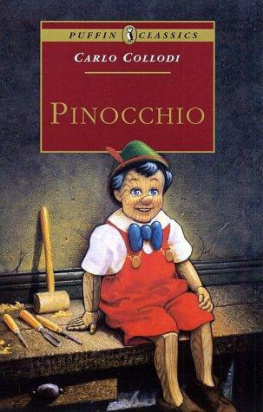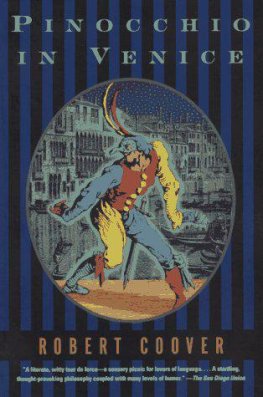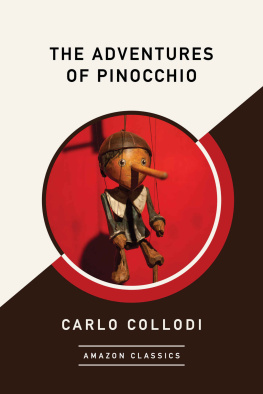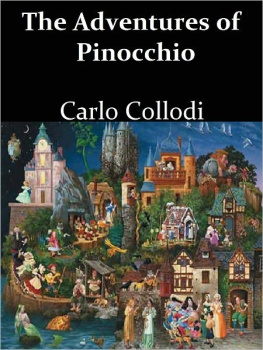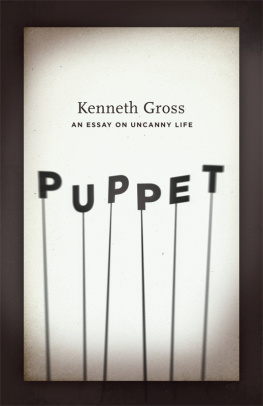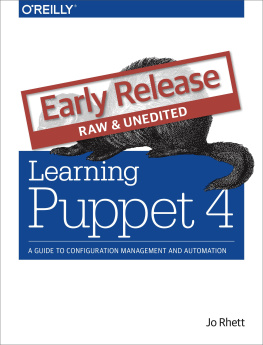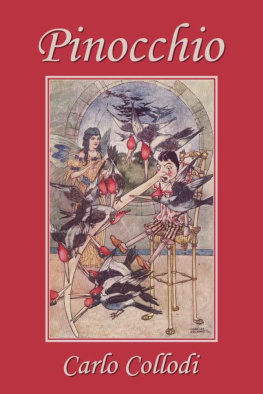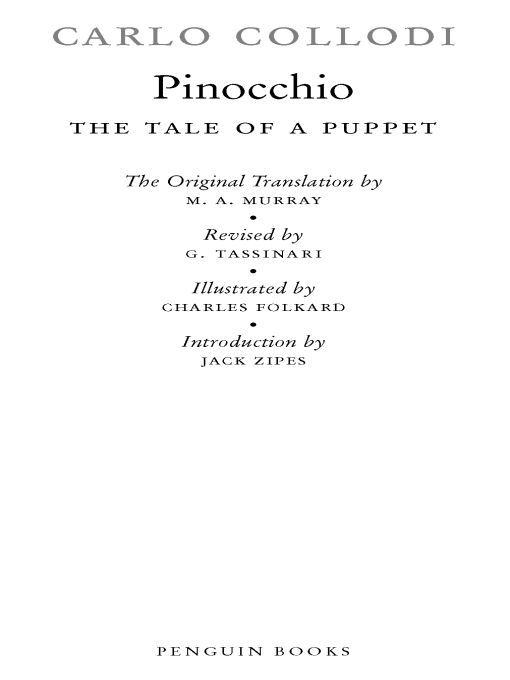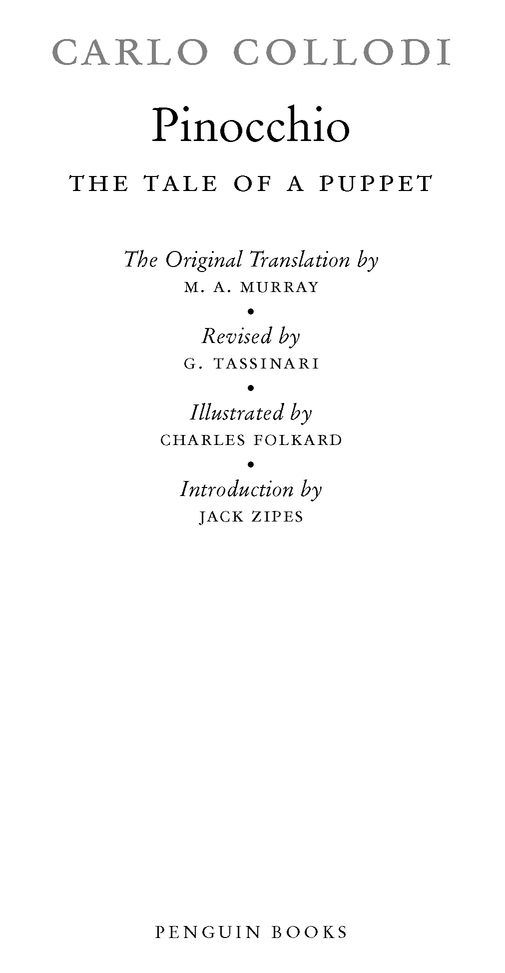Table of Contents
PINOCCHIO
CARLO COLLODI (1826-1890) was the pen name of Carlo Lorenzini, an Italian journalist born in Florence. Collodis life and writings were dedicated to the struggles of the Risorgimentothe Italian liberation movement to free the country from Austrian domination and establish a national identity. As a soldier, Collodi took part in several revolutionary campaigns. He also founded Il Lampione, a newspaper of political satire whose circulation was frequently blocked by the Austrians. In 1875, Collodi put aside his political struggles and turned to a new interest. He wrote to a friend: Now I shall devote myself to writing only for children. Grown-ups are too hard to satisfy; they are not for me. In 1881, the first chapter of Pinocchio appeared in the Giornale dei Bambini, and it was an immediate success. The complete Pinocchio first appeared in book form in 1883.
JACK ZIPES is a professor of German at the University of Minnesota. A specialist in folklore, fairy tales, and childrens literature, he has translated such works as the fairy tales of the Brothers Grimm and Hermann Hesse, written several books of criticism, and edited numerous anthologies including Spells of Enchantment: The Wondrous Fairy Tales of Western Culture (Penguin). He also edited The Wonderful World of Oz, an omnibus comprising L. Frank Baums The Wizard of Oz, The Emerald City of Oz, and Glinda of Oz, for Penguin Classics. He has been honored with the Distinguished Scholar Award by the International Association for the Fantastic in the Arts.
INTRODUCTION
If one were to believe Walt Disneys American film version of Pinocchio (1940), the wooden puppet turned human is a very happy boy at the end of his adventures. After numerous adventures, Pinocchio learns that honesty is the best policy, a message repeatedly driven home by Jiminy Cricket, the films moral voice. Yet, the Italian novel of 1883 by Carlo Collodi is a much different affair. Pinocchio is indeed content to turn human at the end of this narrative, but there is a tragicomic element to the episodes that make one wonder why the puppet must endure so much suffering to become a proper and honest boy. Did Collodi intend to make an example out of Pinocchio, the good bad boy, who must learn to assume responsibility for his actions? Or, did he intend to show the harsh realities of peasant childhood in nineteenth-century Italy? Is Pinocchio perhaps a critical reflection of his own boyhood? After all, Carlo Collodi was not born into a well-endowed family, nor was he born with the name Collodi. His parents belonged to the Italian servant class, and the chances that he would become an important journalist and famous writer were slim. There was a fairy-tale element to his own education and development, and before we can fully understand why his Pinocchio, in contrast to Walt Disneys figure, is a tragicomic figure, we might do well to look at Collodis life and times.
Born Carlo Lorenzini in Florence on November 24, 1826, Collodi was raised in a lower-class family with nine brothers and sisters. Living conditions were so poor that only two of his other siblings managed to survive childhood. His father and mother, Domenico and Angela Lorenzini, worked as servants for the Marquis Lorenzo Ginori, a wealthy aristocrat, who paid for Collodis education. In fact, if it had not been for the Marquis Ginoris help, Collodi would never have gone to school. His parents were very poor, and they had so many children that Collodi, as the oldest, was sent to live with his grandparents in the little town of Collodi outside of Florence, where his mother was born. When he turned ix ten, the Marquis Ginori, acting as a kind of fairy godfather, offered financial aid to send young Collodi to the seminary at Colle Val dElsa to study for the priesthood, but given his mischievous nature and dislike of monastic discipline, Collodi realized that he was not destined to be a priest. Therefore, by the time he was sixteen, Collodi began studying philosophy and rhetoric at the College of the Scolopi Fathers in Florence, and two years later, found a position at the Libreria Piatti, a leading bookstore, where he helped prepare catalogues for Giuseppe Aiazzi, one of the leading specialists for manuscripts in Italy. It was during this time that Collodi met numerous intellectuals and journalists and developed an interest in literature. By 1848, however, Collodi was carried away by patriotic zeal to fight for Italian independence against the Austrians. After the defeat of Italian forces that very same year, he was fortunate to obtain a position as a civil servant in the municipal government of Florence while also working as a journalist, editor, and dramatist. In 1853 he founded the satirical political magazine Il Lampione (The Street Lamp) with the purpose of enlightening his compatriots about political oppression, but this publication was soon banned because his polemical writings were considered subversive by the Grand Duchy, loyal to the Austrian authorities. Not easily defeated, Collodi, started a second journal, Lo Scaramuccia (The Controversy, 1854), which dealt more with theater and the arts than politics and lasted until 1858. Aside from publishing numerous articles, he also tried his hand at writing comedies, which did not have much success when they were produced. Indeed, he was more successful at politics and became known as an activist in liberal circles.
When the Second War of Independence erupted in 1859, Collodi volunteered for the cavalry, and this time, the Italians were victorious. Not only were the Austrians defeated in northern Italy, but the entire country was united under Giuseppe Garibaldi in 1861. It was during the period 1859-1861 that Collodi, still primarily known as Lorenzini, became involved in a dispute about Italian unification with Professor Eugenio Alberi of Pisa, a reputable political writer. In opposition to Alberis negative position, he wrote a booklet defending the rise of a new Italy, and it was entitled, Il signor Alberi ha ragione! Dialogo apologetico (1860), and signed with the pseudonym Collodi in honor of his mothers native village, where he had spent his childhood. It was the first time he used this name not realizing that it would become world famous, mainly through the later publication of a childrens book.
Though convinced that unification was positive for Italy, Collodi soon discovered that the social changes he had expected for all Italians were not about to take place. Instead, the nobility profited most from the defeat of the Austrians, and corruption continued in the government that supported the development of industry and the wealthy classes. He himself was fortunate since he was able to keep his position as a civil servant from 1860 to 1881 in the Commission of Theatrical Censorship and in the Prefecture of Florence. These appointments enabled him to serve as the stage director of the Teatro della Pergola in Florence and on the editorial committee that began research for an encyclopedia of the Florentine dialect. However, Collodi, who still wrote mainly under the name of Lorenzini, did not give up his career as journalist and freelance writer. In fact, he published a number of stories in


